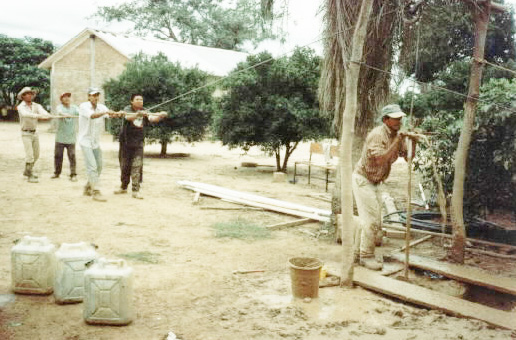Solution of the week 4
Baptist drilling - affordable boreholes made by drilling clubs
If you want to make a borehole (the quickest way to make wells), you have two options. The first is hiring a big machine, which will arrive on a truck from the city, and gets the business done in a few hours. For at least 5.000$, up to 20.000$. Quick, easy, but far from cheap. The second is doing it by hand, using a manual drilling technology. It takes longer, it is heavy work, but it also gets the job done. For about 500$. Now there is an interesting difference in price, don’t you think?
Of course, manual drilling does not work everywhere. Clay, sand, and compacted sand are ok, but rock or large stones are not ok. But it just happens to be the case that hundreds of millions of people live in areas which have just the right soil types. One such country with the right soil type is Bolivia. It is home to two different manual drilling technologies, the EMAS method (which we will meet in one of the next blogs) and the Baptist method.
Baptist drilling
The Baptist method was developed in Africa and Bolivia by Terry Waller, a North American Baptist missionary. It is based on the ancient Asian Sludge method, which has been practiced for millennia in Asia. In Bolivia, some 3000 wells have been drilled with the Baptist method. Baptist well drilling is used in Bolivia, Nicaragua, Kenya, Ethiopia, Mozambique, Cameroon, Zambia and Sri Lanka.
A Baptist drilling rig consists of wooden poles holding up a pulley with a rope. The drill stem consists of lightweight PVC pipes, with the last three meters made of steel pipe, ending in a drill bit. A number of people pull the rope, which causes the drill stem to go up and down in the borehole, drilling an open hole down into the aquifer. No casing is used - the borehole is kept filled with water and the resulting pressure keeps the hole open. When the borehole is deep enough, a casing is installed. A Baptist drilling rig, fit to drill holes up to 30 m deep, can be built in Bolivia for about US$150.
Drilling club approach
Baptist wells are both being drilled by local small drilling enterprises as by ‘water clubs’. Up to ten families form a water club. An organization sponsors the materials, provides initial training and lends the drilling equipment to the club, who then proceed to drill their own wells, with one expert available for troubleshooting.
To make sure the non-expert water clubs make good wells, the technology is first tweaked and adapted by experts to fit the local soil conditions. This gets the price down to the point where families can own their own wells and build and maintain their own pumps &emdash; for a total material cost of 100-200$ in Bolivia, and 70-80$ in Nicaragua and Ethiopia.
As Terry Waller says: "There is no technical reason why individual families cannot have their own family water well and pump that they and their neighbors have made and know how to maintain. They just need someone to stay in their community for a while to show them how." Let's make it so.
Author: Mark Tiele Westra, Editor Akvopedia.
Additional links:

